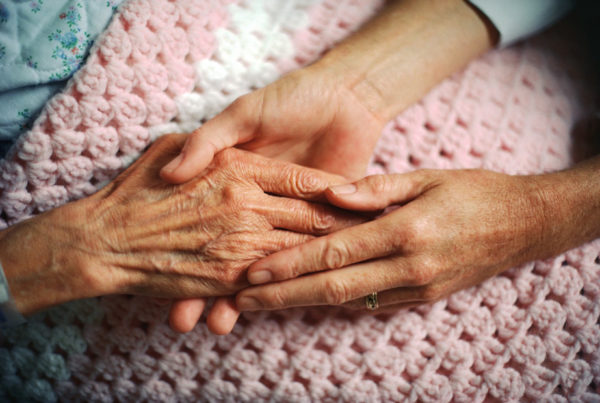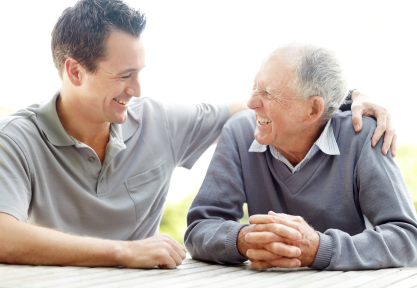Posted by Society of Certified Senior Advisors
Recently, I ran into a woman I hadn’t seen since I was a little girl. When she found out I am the director of prearranged funeral planning at a funeral home that has been caring for the community for four generations she said, “Why would someone work in such a MORBID business?”
Her comment isn’t that unusual, honestly. In my work, I’ve discovered that though our society is steeped in death — school shootings and terrorism in the news, violent movies, tv shows, and video games — when it comes to the more mundane end of life, we don’t want to talk about it.
Talking about death is in bad taste. It’s morbid. It’s taboo. Our approach is never to say “die.” Instead, we whisper that someone “passed away” or even “passed.” We talk about “losing a loved one” who “fought valiantly but ultimately lost in the fight” against a disease.
It reminds me of how we used to approach sex. A generation or two ago, people used euphemisms to talk about body parts — weewee, peepee, hooha — we’ve since learned that the cutesy names are not helpful; they make kids think that their body parts are shameful and weird. To help our kids feel in control of their bodies, we must use anatomically correct terms.
Similarly, using euphemisms for death is an attempt to protect ourselves and those around us. Many of us have a lot of anxiety in thinking about our mortality and that of those we love. It fills us with grief, and guilt, and loss. Even though it’s the only universal human experience, we fool ourselves into believing that if we don’t talk about it, it won’t happen.
The euphemisms are an attempt to keep us safe from the reality. But they also reinforce the idea that we can’t or shouldn’t talk about something that is so fundamental to our humanity. Often that leaves us unable to connect in an authentic way. And it leaves us ashamed to talk about something so very important.
There is a bereavement group in Utah, The Sharing Place. It’s dedicated to helping kids deal with the death of their parents. Did you know that 1 in 20 children will experience the death of a parent before they turn 18? When these kids attend the Sharing Place groups, they each share the circumstances of their loved one’s death using direct terminology. “My mom’s heart stopped and she died.” “My dad had an illness called depression; he used a gun to shoot himself in the head and he died.”
Talking helps us process what happened and normalize the experience. It helps us feel part of a community — less isolated and alone. It gives others permission to share their experience too.
I can’t tell you the number of times when someone meets me and finds out what I do that they say, “I have the weirdest question.” Truthfully, it’s almost never a question I haven’t heard many times before. Because we are so afraid to talk about death, we feel like there is something wrong with us for having any question at all.
Dying happens. It’s part of life. It’s often a very sad part of life, but an important one nonetheless. By accepting the fact that our lives are finite, we can live more meaningfully, more purposefully.
Recently I read a book by Dr. Paul Kalinithi, When Breath Becomes Air. He was a neurosurgeon who developed stage IV lung cancer. He wrote about his experience in dealing with dying patients and his own experience in dying. He said, “By engaging in the reality of death, we can more deeply understand and experience Life.”
Talking about the reality of our mortality can help us to be more self-assured and strong. By talking about death and preparing for the reality of it, we can be much more likely to get what we want and need. But it’s not easy to get started.
According to Ellen Goodman, creator of The Conversation Project, “people need a travel guide to take the first steps down an unfamiliar and difficult road.” The organization created a tool to help people start the discussion. It includes topics such as end-of-life care and funeral planning.
However, these cannot be just one-time conversations. They are discussions we need to revisit regularly, as circumstances change.
When my husband and I did our first Will at age 25, both of us were adamant that we not have artificial life support. Twenty years later, a close friend collapsed on the tennis court when his heart stopped. The paramedics were able to revive him and he was put on a ventilator. Though his body was recovering, he’d been without oxygen so long that his brain was not. His Living Will said not to put him on life support at all. His family, however, needed time to process what had happened. Ultimately, the ventilator was removed nine days later and he died.
With that experience, my husband and I revised our advanced directives. We discussed how we would prefer NOT to be on artificial life support. However, we wanted our loved ones to make the final decision on when to remove it if we were ever in a similar situation to our friend. We recognized that what really mattered was not what each of us might want but what the people who loved us might need.
I am a big believer in talking about funerals too. We are so death-averse, we often think that the only thing that matters is getting rid of the body. Cremation has become really popular and so many people tell me, “I don’t need a funeral. When you’re dead, you’re dead.” What they don’t recognize is that the funeral is not really for the dead person, it’s for the people that are left behind. A communal event, a time for people to get together and share their feelings is often incredibly healing. Dr. Alan D. Wolfelt, grief researcher describes this ritual as a “symbolic activity that helps us, together with our families and friends, express our deepest thoughts and feelings about life’s most important events.”
When we are told NOT to talk about something — sex, depression, death — we feel shame, embarrassment about it. We need to get better at having these important conversations regularly and from a point of strength. By talking truthfully we can take some of the power out of these issue and feel relief. And we can use these conversations to get closer to the people we love most.
By Jamie Sarche Posted by Society of Certified Senior Advisors






2abstracted